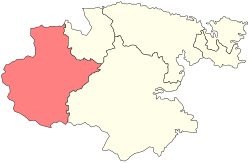Bilibinsky District
| Bilibinsky District Билибинский район (Russian) |
|
|---|---|
 Location of Bilibinsky District in Chukotka Autonomous Okrug |
|
| Coordinates: 68°03′N 166°27′E / 68.050°N 166.450°ECoordinates: 68°03′N 166°27′E / 68.050°N 166.450°E | |
 The Maly Anyuy River in Bilibinsky District |
|
|
|
|
| Location | |
| Country | Russia |
| Federal subject | Chukotka Autonomous Okrug |
| Administrative structure (as of June 2012) | |
| Administrative center | town of Bilibino |
| Inhabited localities: | |
| Cities/towns | 1 |
| Urban-type settlements | 4 |
| Rural localities | 5 |
| Municipal structure (as of October 2010) | |
| Municipally incorporated as | Bilibinsky Municipal District |
| Municipal divisions: | |
| Urban settlements | 1 |
| Rural settlements | 4 |
| Local government: | |
| Head of the Administration | Leonid Nikolayev |
| Statistics | |
| Area (municipal district) | 174,652 km2 (67,434 sq mi) |
| Population (2010 Census) | 7,866 inhabitants |
| • Urban | 70.0% |
| • Rural | 30.0% |
| Population (January 2016 est.) | 7,609 inhabitants |
| Density | 0.05/km2 (0.13/sq mi) |
| Time zone | PETT (UTC+12:00) |
| Established | December 10, 1930 |
| Official website | |
| on | |
Bilibinsky District (Russian: Били́бинский райо́н) is an administrative and municipal district (raion), one of the six in Chukotka Autonomous Okrug, Russia. It is located in the west of the autonomous okrug and borders with Chaunsky District in the northeast, Anadyrsky District in the east, Koryak Okrug of Kamchatka Krai in the southeast, Magadan Oblast in the southwest, and the Sakha Republic in the west. The area of the district is 174,652 square kilometers (67,434 sq mi). Its administrative center is the town of Bilibino. Population: 7,866 (2010 Census);8,820 (2002 Census);27,847 (1989 Census). The population of Bilibino accounts for 70.0% of the district's total population.
Archeological finds indicate that the territory of what is now Bilibinsky District was first inhabited in the early Neolithic. Following the establishment of Anadyrsk by Semyon Dezhnyov in the 17th century, the Bolshoy Anyuy River, which flows through the modern district, was an important link between the Cossack explorers and their base in Nizhnekolymsk and facilitated interactions between the Cossacks and the indigenous people. Gold and other minerals were discovered in the 20th century, and in the 1970s the world's smallest and most northerly nuclear power station was built in Bilibino.
...
Wikipedia

